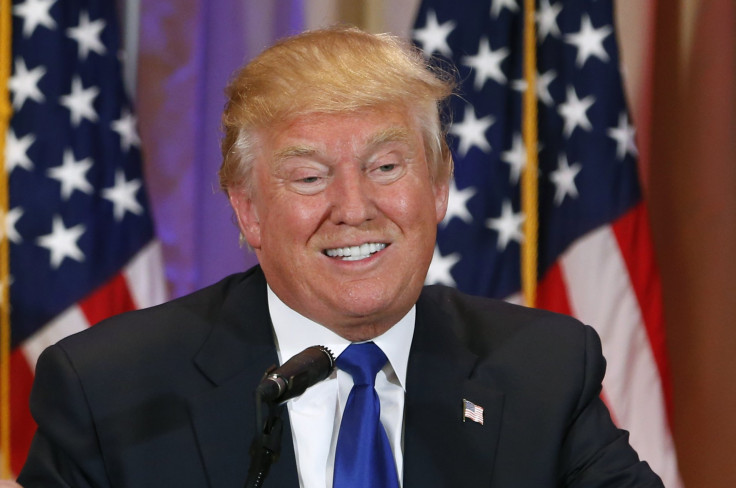Donald Trump Voter Turnout: Is GOP Candidate Outpacing Romney In 2012 Following Super Tuesday Surge?

Donald Trump will tell anyone with ears that he's inspiring Americans everywhere, drawing record crowds and voter turnouts, and that the wave will keep on rolling through victory in November. Following a slew of Super Tuesday wins, the undisputed front-runner boasted in a news conference at a Florida resort he owns: "I will say this, look: We have expanded the Republican Party," before adding, "Look, I’m a unifier."
Trump has previously proclaimed that he'll square off with Democratic front-runner Hillary Clinton in the general election and it will draw "the greatest turnout in history." But for all his typical bluster, there is some truth to Trump's claims.
Trump has recorded more total votes through Super Tuesday than former Massachusetts Gov. Mitt Romney did on his way to the nomination in 2012, despite Romney having the benefit of seven additional states voting through Super Tuesday that year. And when comparing the states that have already voted in the 2016 GOP primaries and caucuses with the corresponding 2012 results, the gap between Trump and Romney widens considerably. Further anecdotal evidence and polls also suggest that Trump could be pulling in voters not typically aligned with the Republican Party. While it's still a long way until November, through Super Tuesday, Trump's signature brand of braggadocio seems to have inspired thousands to get out and vote for him, which can only be a good sign for his chances in a general election.
Trump is "bringing in some people," said Ford O’Connell, a political analyst and Republican strategist who worked on the 2008 John McCain presidential campaign. "He is cobbling together a group of people we haven't seen in some time."
Overall Republican turnout has been higher this election season so far than in 2012, when the GOP saw "dismally low" rates. In Virginia, for instance, just 265,000 eligible Republican voters took to the polls in 2012, compared with more than 1 million on Tuesday, according to Election Project data. And Trump, who has now won 10 total states and 316 delegates, has racked up the votes, especially in comparison with Romney in 2012.
Using data from the Federal Election Commission, Politico and CNN, International Business Times added up the numbers. Trump has earned 3,365,355 total votes through Super Tuesday, while Romney garnered a total of 3,280,028 through Super Tuesday in 2012. That's a difference of 85,327 or 2.6 percent, despite the fact that in 2012 seven more states had voted through Super Tuesday.
Comparing Trump's results directly to Romney's support in the same states further widens the gap. Trump's 3,365,355 total votes dwarfs Romney's total of 2,604,735 in that comparison.
Trump's strongest base has been GOP supporters who are angry at the party leadership and working-class white voters without a college education, O'Connell said, but he added that the businessman is also poaching Democrats who feel left behind by their party. Some evidence backs that up.
A poll released in early January found 20 percent of likely Democratic voters would defect to vote for Trump, while a CNN exit poll in Virginia found 6 percent of voters in the Republican primary were Democrats. Nearly 20,000 Democrats left the party this year in Massachusetts, which Massachusetts Secretary of State William Galvin theorized was a product of the "Trump phenomenon," according to the Boston Herald.
But two of Trump's key stances could also be inspiring voters. CBS News exit polls found that 60 to 80 percent of Republican voters across the Super Tuesday states supported Trump's call to temporarily bar foreign Muslims from entering the U.S. and that he gained 40 to 55 percent of their support. Exit polls also found Trump earned support from about half of the Republican voters who wanted to deport undocumented immigrants, and performed well among voters concerned about the direction of the U.S. economy.
Party affiliation tends to run strong, but Trump has been able to capitalize on a sizable portion of Democrats who are concerned about illegal immigration and border security, said Yamil Velez, an assistant professor of government at Wesleyan University in Middletown, Connecticut, who has taught a course on racial politics.
"When people care deeply enough about an issue … that might be enough to cause someone to defect. I think that’s particularly explaining what's going on," Velez said. Trump has also been able to appeal to "disaffected working-class voters," who are focused on economic issues, he added.
But while Trump may claim that he'll do well with minority voters, that was a claim Velez found questionable, saying he would not "expect much movement."
In fact, even after his Super Tuesday victories, Republican leaders are reportedly making a last-second push to keep him from the nomination. O'Connell said Trump is looking increasingly electable, but "I think his problem is whether or not he can unify those who consider themselves Republicans."
© Copyright IBTimes 2024. All rights reserved.






















